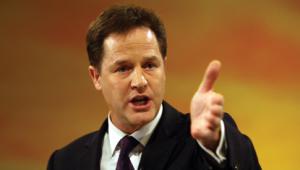20 June 2003
Targets hold back reforms, say LibDems…
The government's obsession with targets is distracting public bodies from efforts to improve services, Edward Davey has warned.
The Liberal Democrat spokesman for the Office of the Deputy Prime Minister told Public Finance that ministers' attempts to manage public service reform from Whitehall were, in reality, getting in the way of progress.
'The government has approached targets in the wrong way. They are supposed to give a focus, but there are far too many of them. The target culture has gone mad,' he said. 'We would ensure democratic involvement in how you arrive at the targets in the first place.'
He cited the NHS as an example of an organisation where targets were 'holding progress back to an alarming extent' and 'distorting clinical priorities'.
Earlier, Davey told delegates at the CIPFA annual conference in Harrogate that the government's much-vaunted policy shift towards devolution – branded 'new localism' – was 'a fraud' and 'superficial baloney'.
Davey said that real freedom from Whitehall control would only come if local authorities were given financial autonomy, but this had proved to be 'a nettle that New Labour has not been prepared to grasp'.
He restated the LibDems' commitment to introducing a local income tax, which was the party's key policy during the campaign for the local elections earlier this year.
Council tax was 'deeply regressive', Davey said, and a tax linked to salary and levied through the PAYE system would address this unfairness, while also substantially increasing the proportion of authorities' funding raised locally.
The idea had already been successfully implemented in countries as diverse as Denmark, Japan and the US, he added. 'It is an idea whose time has come.'
Davey said his party was also in favour of 'broadening the range of those who supply services', and called for the increased use of mutual organisations as a way of promoting community involvement and democratic accountability.
Turning to central government, Davey said backbenchers should have a far greater say when the government sets the Budget.
MPs should have the power to cut a department's allocation or to switch money from one ministry to another. He also called on his fellow politicians to adopt a more challenging stance towards the executive.
'Parliament is so supine, weak and pathetic when it comes to finance,' Davey said.
… but schools czar praises performance measures
London schools czar Professor Tim Brighouse defended education targets, claiming that they are a 'necessary evil' for any system in which continued improvement is paramount.
Speaking in Harrogate on June 12, Brighouse told delegates that recent criticism of targets had gone too far and that, with a little adjustment, ministers will find the right balance between centralised incentives for pupils and teachers and local flexibility to pursue individual or regional education needs.
Brighouse, former chief education officer at Birmingham Local Education Authority, one of the first organisations to introduce widespread targets, said: 'We needed to shift the mindset of the people involved in education. Targets, combined with formative assessments, gave them a sense of what could be achieved. '
But he warned ministers that targets must be 'bottom-up' and supported by teachers, and not simply 'top-down' edicts from Whitehall that bear no resemblance to what schools can achieve.
He later told Public Finance: 'It is a tough balance to strike, but I believe that ministers are slowly getting it right. You need incentives, but they must be genuine and achievable. The government has taken that on board.'
Commenting on his new role as the Department for Education and Skills' commissioner for London schools, Brighouse said he faced 'serious challenges' in the capital, but was determined to help schools spread good practice so that it became the 'generalised' norm.
He said: 'I want people to say of London's schools "What on earth happened?".'
IR has got to grips with its finance failings, says Montagu
The Inland Revenue failed to monitor its budgets on a regular basis and has only recently set up a finance committee to scrutinise its outgoings, its chair told the conference.
Sir Nick Montagu conceded that this has been an 'area of significant neglect'.
He told the conference on June 12 that the service had undergone substantial change and he had consciously drawn up a structure based on Turnbull principles to bring it closer to private sector corporate governance.
In a speech on risk management Montagu said that he faced a 'centre of government more interventionist than any in 29 years as a civil servant'. He criticised the government's central bureaucracy and the proliferation of delivery and improvement bodies, such as the Cabinet Office, Office for Public Services Reform, Delivery Unit and the Number 10 Policy unit. He said these presented 'scope for intervention and division'.
Montagu said the National Audit Office played a 'critical role' in overseeing the Revenue's work but claimed the relationship between the two was not adversarial. 'There are constructive tensions,' he said.
PFjun2003


















